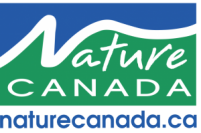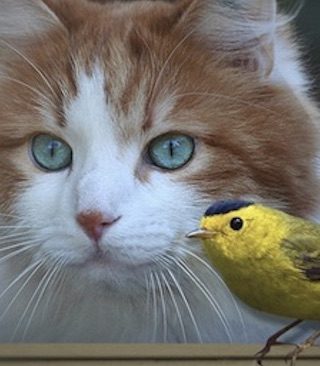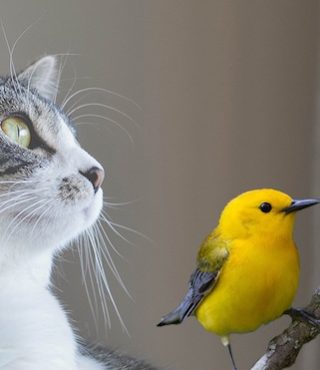Cats and Birds at the National Animal Welfare Conference

At the 2017 National Animal Welfare Conference (NAWC) hosted by the Canadian Federation of Humane Societies, Cats & Birds presented a panel discussion on our pilot project in Guelph, Ontario. The pilot was designed to foster intensive local action on the issues for cats and birds, and help us learn how to better mobilize community action.
The panel was presented by Ted Cheskey, the Senior Manager of Bird Conservation at Nature Canada, Lisa Veit, the Associate Director of the Guelph Humane Society, Dr. Tyler Flockhart, a member of the Guelph Cat Population Task Force, and Sarah Cooper, the project manager for Keep Cats Safe and Save Bird Lives.
Ted began the panel by presenting an overview of the state of Canada’s bird population and the story of how Nature Canada came to create a national network of cat-care and nature organizations to tackle these complex issues. Tyler presented data on Canada’s cat populations and the research estimating the impact outdoor cats have on birds, and Lisa discussed GHS’s position, the breadth of opinions among cat-owners, and the importance of collaborative efforts to educate the public. Finally, Sarah gave a description of the pilot model of “Convene – Collaborate – Act” and the advocacy and public education activities involved.
Watch an edited version of the panel presentation:
The Guelph pilot began by convening a group of stakeholders to work together. We identified all the organizations that were involved with cats or birds, met with them individually and invited them to join a local effort to improve the welfare of both. We facilitated a meeting between representatives of the various groups, and while that meeting was not without its challenges, we ultimately agreed on the common ground of love for animals and a messaging strategy. Our partners in Guelph included Nature Guelph, the Guelph Humane Society (GHS), the Arboretum at the University of Guelph, Wild Birds Unlimited, Wild Ontario, Songbird Only Avian Rehabilitation and the Guelph Cat Population Task Force. Together we formulated an action plan to make Guelph a safer place for cats and birds.
Over the course of 2016 and 2017, we:
• conducted a baseline poll of Guelph residents to better determine local attitudes and practices (65.3% of Guelph cat owners already keep their cats from roaming unsupervised);
• co-wrote a Guelph brochure with info on local birds & cats;
• adapted national resources to the local scenario;
• recruited local veterinarians and pet stores to distribute the Guelph brochure;
• created & promoted a local version of the pledge (“to make Guelph a safer place for cats & birds”)
• social media posts and digital advertising;
• co-created posters and display in public libraries, City Hall, etc.;
• co-created several resources for partners’ ‘teachable moments’ – Never Lose Your Cat Again (when owner is reclaiming a lost cat from GHS); Safe, Happy Cats (when someone’s adopting a new cat from GHS); Never Feel that Way Again (when a cat-owner brings injured bird into SOAR or GHS);
• recruited new volunteers & mobilized partners’ existing volunteers;
• trained volunteers in messaging & communications strategies;
• engaged volunteers in peer-to-peer communications at local events, farmers’ markets, festivals, etc; outreach presentations to cat-owners on Safe Outdoor Options; outreach presentations to bird-lovers; letters to the editor and local press coverage of the issue; and letters to the city urging them to create solutions for both cats & birds.
Discussions revealed that limitations on shelter capacity in Guelph meant moving to a no-roam bylaw was beyond the community’s capacity at present, and there were additional concerns about the cost of enforcement and rates of compliance. Given these concerns, the coalition urged the adoption of long-term plan to build capacity and create an environment in which a no-roam bylaw could succeed.
In December 2016, the City adopted a new bylaw enacting cat licensing (to provide a revenue stream for cat management), and agreed to dedicate $5 from each license to cat programs, including a public education campaign about the risks to cats, birds and people of the practice of letting cats roam unsupervised. The City is now officially partnering with the pilot coalition on those communications efforts. In 5 years, Guelph will evaluate the impact of the campaign and the need to introduce further legislation.
The City has also substantially improved its communications around outdoor cats and committed to hosting a series of events to educate the public about animal welfare, including sessions about safe outdoor options for cats and how to help bird conservation.
The work in Guelph continues – lasting social change takes longer than a year – but there is no doubt that the project has given the community new educational tools, improved the tenor of the debate, amplified the voices calling for improved welfare for cats and birds, and improved the legislative context. Nature Canada will continue to support the local coalition, and together we will keep working towards safe cats and safe birds in Guelph. Nature Canada also used our experience in Guelph to create a ‘toolkit’ for local action, and we plan to explore its application in different regions, legislative contexts and sizes of communities.
We look forward to the 2018 NAWC!








